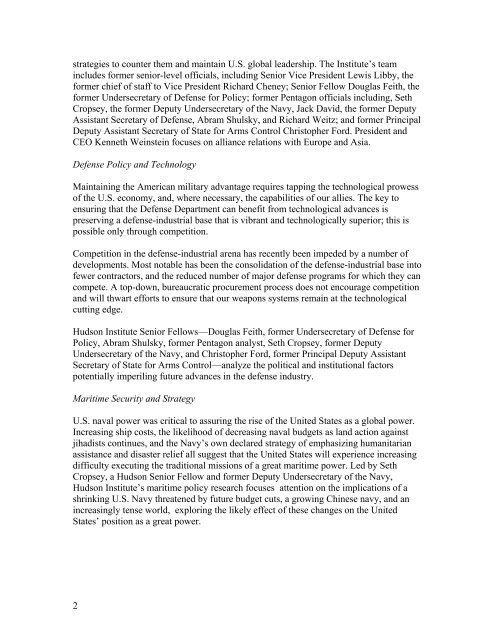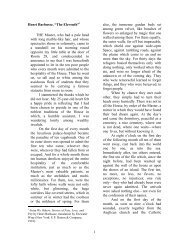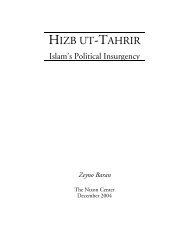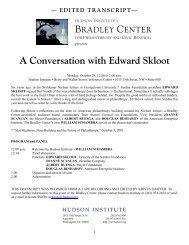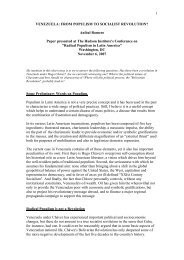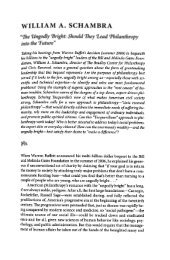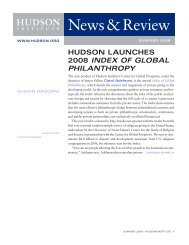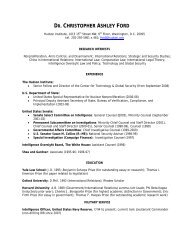Download PDF - Hudson Institute
Download PDF - Hudson Institute
Download PDF - Hudson Institute
Create successful ePaper yourself
Turn your PDF publications into a flip-book with our unique Google optimized e-Paper software.
strategies to counter them and maintain U.S. global leadership. The <strong>Institute</strong>’s team<br />
includes former senior-level officials, including Senior Vice President Lewis Libby, the<br />
former chief of staff to Vice President Richard Cheney; Senior Fellow Douglas Feith, the<br />
former Undersecretary of Defense for Policy; former Pentagon officials including, Seth<br />
Cropsey, the former Deputy Undersecretary of the Navy, Jack David, the former Deputy<br />
Assistant Secretary of Defense, Abram Shulsky, and Richard Weitz; and former Principal<br />
Deputy Assistant Secretary of State for Arms Control Christopher Ford. President and<br />
CEO Kenneth Weinstein focuses on alliance relations with Europe and Asia.<br />
Defense Policy and Technology<br />
Maintaining the American military advantage requires tapping the technological prowess<br />
of the U.S. economy, and, where necessary, the capabilities of our allies. The key to<br />
ensuring that the Defense Department can benefit from technological advances is<br />
preserving a defense-industrial base that is vibrant and technologically superior; this is<br />
possible only through competition.<br />
Competition in the defense-industrial arena has recently been impeded by a number of<br />
developments. Most notable has been the consolidation of the defense-industrial base into<br />
fewer contractors, and the reduced number of major defense programs for which they can<br />
compete. A top-down, bureaucratic procurement process does not encourage competition<br />
and will thwart efforts to ensure that our weapons systems remain at the technological<br />
cutting edge.<br />
<strong>Hudson</strong> <strong>Institute</strong> Senior Fellows—Douglas Feith, former Undersecretary of Defense for<br />
Policy, Abram Shulsky, former Pentagon analyst, Seth Cropsey, former Deputy<br />
Undersecretary of the Navy, and Christopher Ford, former Principal Deputy Assistant<br />
Secretary of State for Arms Control—analyze the political and institutional factors<br />
potentially imperiling future advances in the defense industry.<br />
Maritime Security and Strategy<br />
U.S. naval power was critical to assuring the rise of the United States as a global power.<br />
Increasing ship costs, the likelihood of decreasing naval budgets as land action against<br />
jihadists continues, and the Navy’s own declared strategy of emphasizing humanitarian<br />
assistance and disaster relief all suggest that the United States will experience increasing<br />
difficulty executing the traditional missions of a great maritime power. Led by Seth<br />
Cropsey, a <strong>Hudson</strong> Senior Fellow and former Deputy Undersecretary of the Navy,<br />
<strong>Hudson</strong> <strong>Institute</strong>’s maritime policy research focuses attention on the implications of a<br />
shrinking U.S. Navy threatened by future budget cuts, a growing Chinese navy, and an<br />
increasingly tense world, exploring the likely effect of these changes on the United<br />
States’ position as a great power.<br />
2


